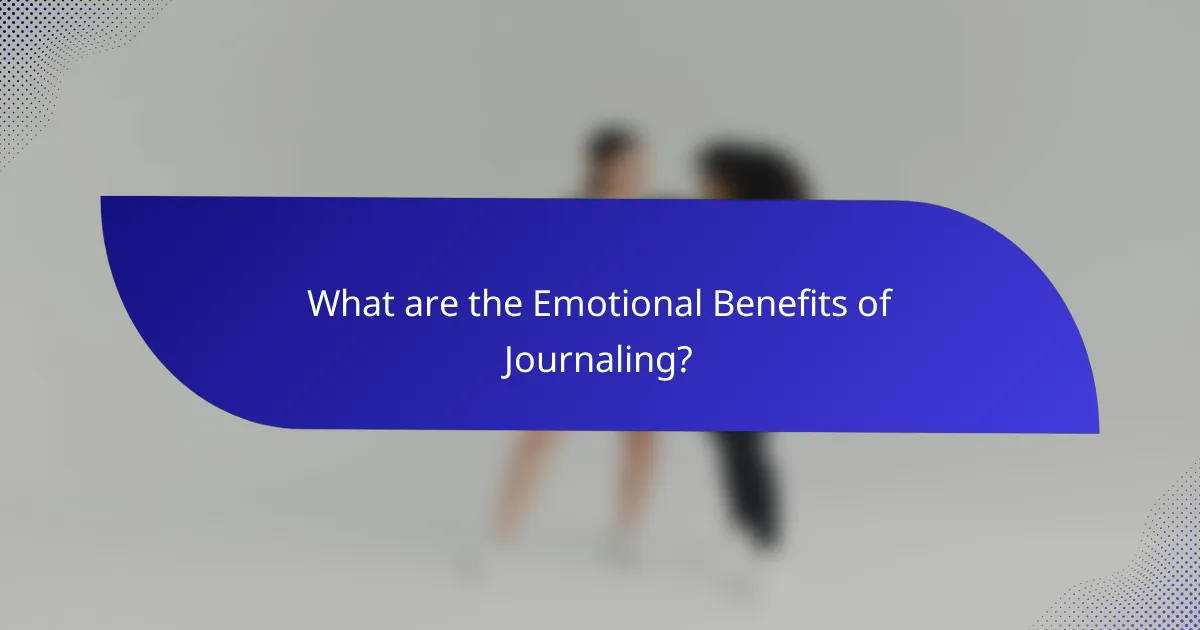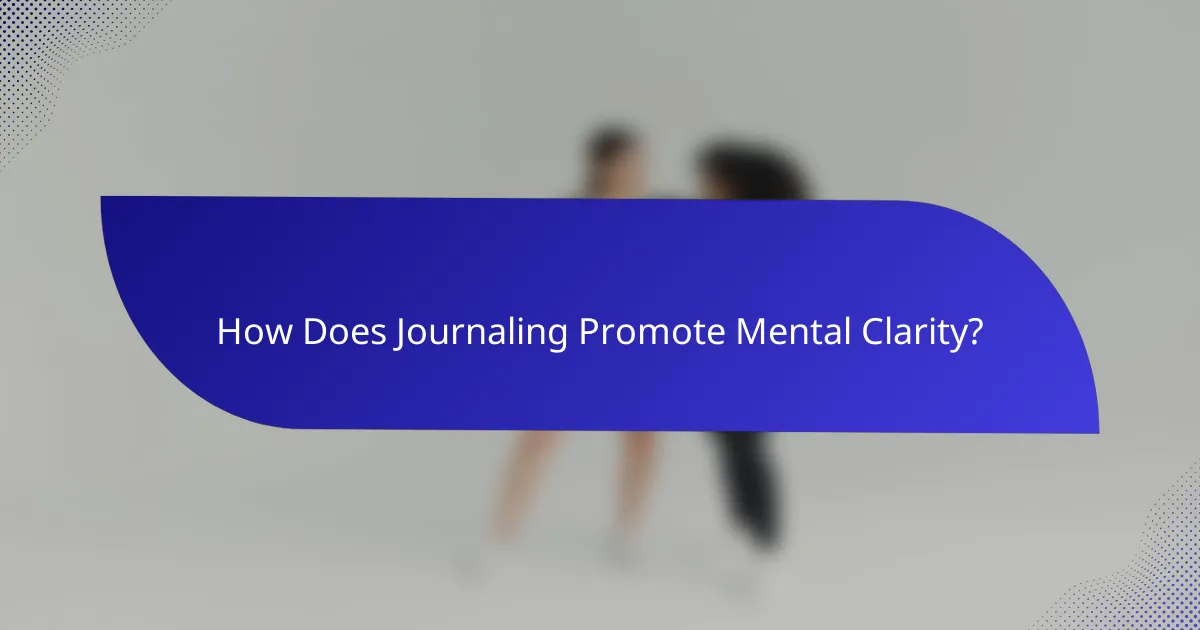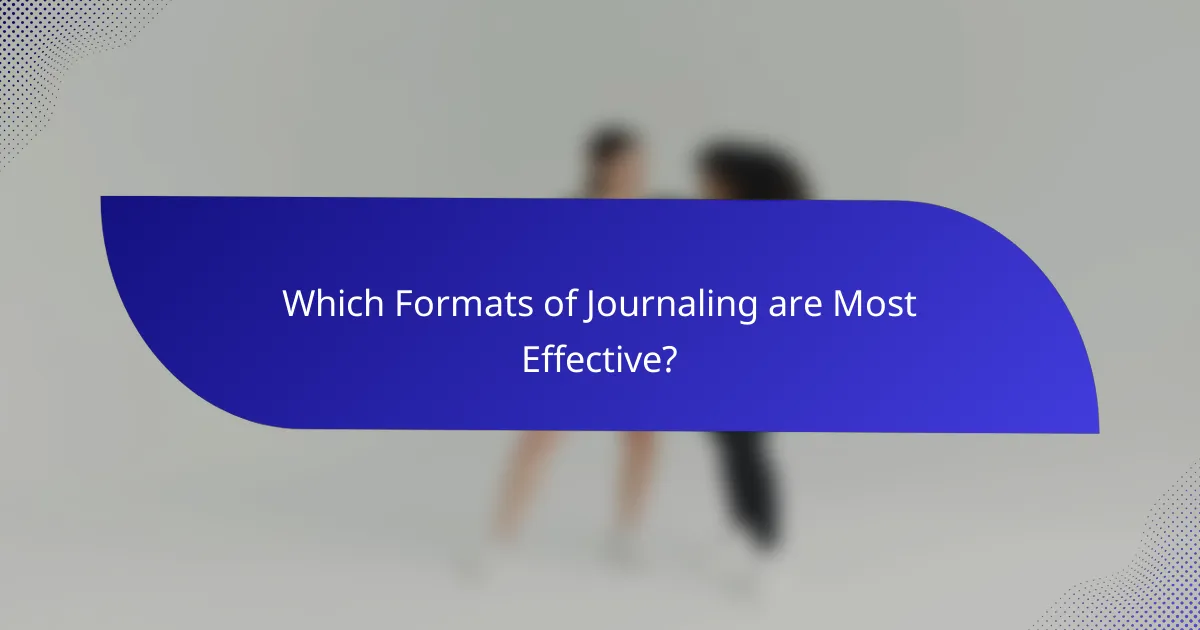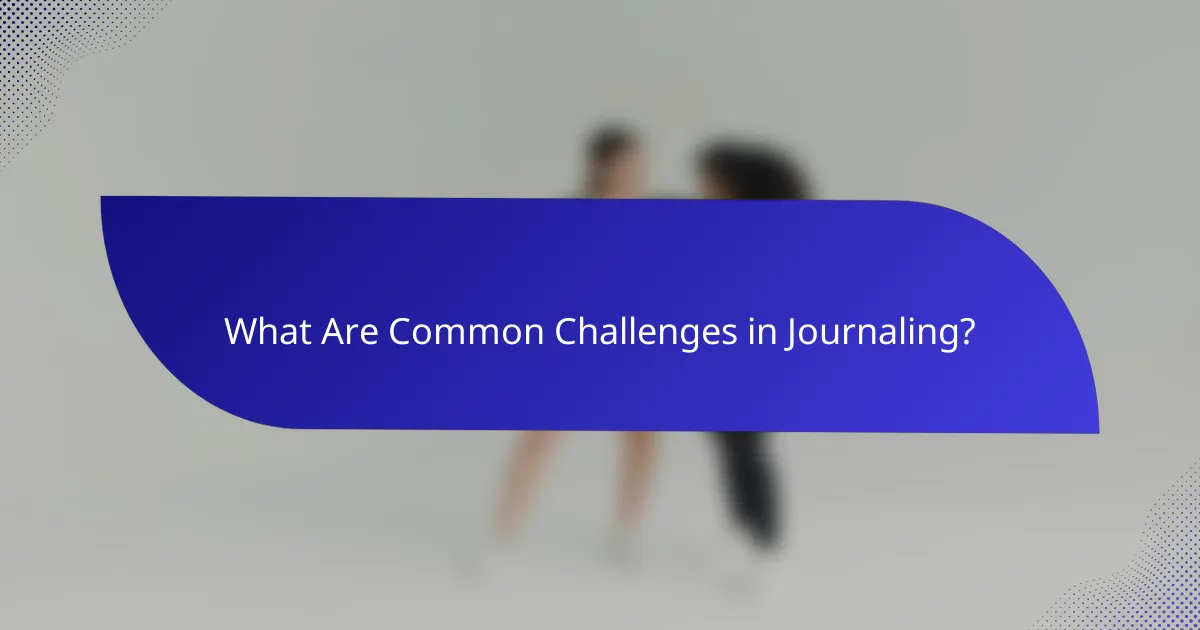Journaling enhances emotional expression and mental clarity by providing a structured outlet for thoughts and feelings. It promotes self-awareness, reduces stress, and helps individuals process experiences. Various journaling formats, such as free writing and bullet journaling, cater to different preferences. Overcoming common challenges like writer’s block can further enhance the benefits of this versatile tool.

What are the Emotional Benefits of Journaling?
Journaling offers significant emotional benefits, enhancing self-awareness and mental clarity. It provides a safe space for expressing thoughts and feelings, leading to reduced stress and anxiety. Regular writing fosters emotional processing, helping individuals gain insights into their experiences. By tracking emotions over time, journaling can reveal patterns that promote personal growth and resilience.
How does Journaling Enhance Self-Awareness?
Journaling significantly enhances self-awareness by allowing individuals to reflect on their thoughts and emotions. This practice fosters emotional expression, leading to greater mental clarity and insight into personal experiences. By regularly documenting feelings, individuals can identify patterns in their behavior and thought processes, which is crucial for personal growth. Studies show that expressive writing can reduce stress and improve overall well-being, making journaling a powerful tool for self-discovery.
Why is Emotional Release Important in Journaling?
Emotional release is crucial in journaling as it facilitates healing and self-discovery. By expressing feelings on paper, individuals can process emotions, reduce stress, and gain mental clarity. This practice enhances emotional regulation and fosters a deeper understanding of personal experiences. Studies show that writing about emotions can lead to improved psychological well-being and resilience over time.
Which Mental Health Conditions Can Benefit from Journaling?
Journaling can benefit various mental health conditions, including anxiety, depression, PTSD, and stress-related disorders. By facilitating emotional expression, journaling helps individuals process feelings and gain clarity. Research indicates that expressive writing can reduce symptoms of anxiety and depression by allowing for reflection and emotional release. For those with PTSD, journaling serves as a tool for narrative therapy, aiding in the reconstruction of traumatic experiences. Overall, the practice promotes mental clarity and emotional well-being across different mental health challenges.

How Does Journaling Promote Mental Clarity?
Journaling promotes mental clarity by providing a structured outlet for thoughts and emotions. It helps individuals process experiences, reduce anxiety, and enhance self-awareness. Regular writing encourages reflection, which leads to clearer thinking and decision-making. Studies show that expressive writing can improve cognitive function, as it organizes thoughts and emotions, allowing for better focus and clarity.
What Techniques Improve Focus Through Journaling?
Journaling techniques such as free writing, structured prompts, and gratitude lists significantly enhance focus. These methods encourage clarity of thought and emotional processing, leading to improved mental clarity.
Free writing allows for uninterrupted expression, helping to clear the mind of distractions. Structured prompts provide direction, enabling focused exploration of specific thoughts or feelings. Gratitude lists foster a positive mindset, which can enhance concentration on tasks.
Incorporating these techniques into a daily routine can lead to sustained mental clarity and emotional balance, ultimately improving overall focus.
How Can Structured Journaling Reduce Anxiety?
Structured journaling can significantly reduce anxiety by providing a clear outlet for emotional expression and promoting mental clarity. This practice allows individuals to organize thoughts, identify triggers, and process feelings effectively.
By regularly writing down experiences and emotions, individuals can gain insights into their anxiety patterns. This self-reflection fosters a sense of control, leading to reduced feelings of overwhelm. Studies show that expressive writing can lower anxiety levels by facilitating emotional release and enhancing self-awareness.
Moreover, structured journaling encourages the use of specific prompts or frameworks, which can guide users in exploring their feelings more deeply. Techniques such as gratitude journaling or cognitive behavioral journaling can shift focus from negative thoughts to positive reflections, further alleviating anxiety.
In summary, structured journaling serves as a powerful tool for managing anxiety through emotional expression, self-reflection, and mental organization.

Which Formats of Journaling are Most Effective?
Writing in various formats can enhance the effectiveness of journaling for emotional expression and mental clarity. The most effective formats include free writing, structured prompts, bullet journaling, and visual journaling.
Free writing allows for unrestricted thought flow, fostering deeper emotional exploration. Structured prompts provide direction, helping individuals focus on specific feelings or experiences. Bullet journaling combines organization with creativity, promoting clarity and tracking progress. Visual journaling incorporates images and drawings, appealing to those who express emotions better through art.
These formats cater to different preferences, ensuring journaling remains a versatile tool for mental well-being.
What Role Does Digital Journaling Play in Modern Practices?
Digital journaling enhances emotional expression and mental clarity by providing a safe space for self-reflection. It allows individuals to articulate thoughts and feelings, leading to improved emotional processing. Studies indicate that regular journaling can reduce anxiety and stress levels, promoting mental well-being. Additionally, digital formats offer accessibility and organization, making it easier to track emotional patterns over time. This practice fosters mindfulness, encouraging users to be present and engaged with their experiences. Overall, digital journaling serves as a powerful tool for personal growth and emotional health.
How Does Creative Journaling Differ from Traditional Journaling?
Creative journaling emphasizes self-exploration and artistic expression, while traditional journaling focuses on recording daily events. Creative journaling often incorporates visuals, prompts, and free-form writing, enhancing emotional expression. Traditional journaling typically follows a structured narrative, concentrating on factual recounting. As a result, creative journaling can foster deeper mental clarity and emotional release compared to conventional methods.

What Unique Approaches to Journaling Exist?
Unique approaches to journaling include expressive writing, bullet journaling, art journaling, gratitude journaling, and digital journaling. Each method enhances emotional expression and mental clarity in distinct ways.
Expressive writing focuses on free-flowing thoughts, facilitating emotional release. Bullet journaling combines organization with creativity, promoting mindfulness. Art journaling integrates visual elements, allowing for non-verbal expression. Gratitude journaling fosters positivity by documenting things to be thankful for. Digital journaling offers convenience and accessibility, enabling easy reflection and organization.
These unique approaches provide varied benefits, catering to different preferences and enhancing overall well-being.
How Can Guided Journals Facilitate Emotional Expression?
Guided journals enhance emotional expression by providing structured prompts that encourage self-reflection. They facilitate deeper insights into feelings and thoughts, enabling users to articulate emotions more clearly. This process fosters mental clarity and emotional regulation. Research shows that regular journaling can reduce anxiety and improve overall well-being, reinforcing the therapeutic benefits of guided journaling.
What Are the Benefits of Bullet Journaling for Mental Clarity?
Bullet journaling enhances mental clarity by organizing thoughts, tracking emotions, and fostering mindfulness. This practice allows individuals to reflect on their feelings and experiences, leading to improved emotional expression.
Additionally, bullet journaling can reduce anxiety by providing a structured outlet for stress. Studies indicate that writing about emotions can decrease mental clutter, promoting a clearer mindset.
The unique attribute of bullet journaling lies in its customizable nature, allowing users to tailor their entries to their personal needs. This adaptability makes it an effective tool for enhancing mental clarity and emotional well-being.
Overall, the benefits of bullet journaling include improved focus, emotional regulation, and a deeper understanding of one’s thoughts.

What Are Common Challenges in Journaling?
Common challenges in journaling include writer’s block, emotional discomfort, and consistency. Many individuals struggle to articulate feelings, leading to frustration. Additionally, finding time to journal regularly can be difficult, impacting the benefits of emotional expression and mental clarity. Overcoming these obstacles often requires establishing a routine and creating a safe space for reflection.
How Can One Overcome Writer’s Block in Journaling?
To overcome writer’s block in journaling, establish a routine and create a conducive environment. This practice enhances emotional expression and mental clarity. Start with free writing to stimulate thoughts. Setting specific prompts can also guide your writing. Additionally, allow yourself to write imperfectly; this reduces pressure and encourages creativity. Engaging in reflective reading can inspire new ideas and perspectives.
What Strategies Help Maintain a Consistent Journaling Habit?
Establishing a consistent journaling habit enhances emotional expression and mental clarity. Start by setting a specific time for journaling each day.
1. Choose a comfortable space to write without distractions.
2. Use prompts to inspire your writing and maintain focus.
3. Keep your journal easily accessible to encourage spontaneous entries.
4. Set achievable goals, like writing for five minutes daily, to build momentum.
5. Reflect on your progress weekly to stay motivated and adjust your approach.
6. Experiment with different journaling styles, such as bullet journaling or gratitude logs, to find what resonates.

What Practical Tips Can Enhance Your Journaling Experience?
To enhance your journaling experience, incorporate these practical tips. Establish a routine to create consistency, which fosters emotional expression. Use prompts to guide your thoughts, helping clarify feelings. Experiment with different formats, like bullet points or sketches, to keep the process engaging. Reflect regularly on past entries to track emotional growth and mental clarity.
Which Prompts Foster Deeper Emotional Insights?
Journaling prompts that encourage self-reflection foster deeper emotional insights. Specific questions like “What am I grateful for today?” or “How did I feel during a significant moment this week?” help individuals explore their emotions. These prompts encourage vulnerability and honesty, revealing underlying feelings and thoughts. Regular use can enhance emotional awareness and clarity, contributing to better mental health.
How to Create a Personalized Journaling Routine?
To create a personalized journaling routine, start by setting a specific time daily for reflection. This consistency enhances emotional expression and mental clarity. Choose a comfortable space that inspires creativity. Select a journaling method that resonates, such as free writing or prompts. Additionally, consider incorporating gratitude lists to boost positivity. Over time, adjust your routine based on what feels most beneficial for your mental well-being.
What Mistakes Should Be Avoided in Journaling for Mental Clarity?
To achieve mental clarity through journaling, avoid these common mistakes. Failing to establish a consistent routine can hinder emotional expression. Writing without intention may lead to scattered thoughts, reducing clarity. Neglecting to reflect on past entries prevents growth. Lastly, comparing your journaling journey to others can diminish personal progress.